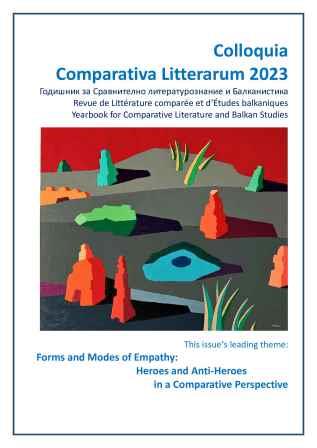
За книгата: Галин Тиханов. Световна литература. Космополитизъм. Изгнание. София, Кралица Маб, 2022, 428 с.
Book review: Galin Tihanov. World Literature, Cosmopolitism, Exile. Sofia, Kralitsa Mab, 2022.
More...We kindly inform you that, as long as the subject affiliation of our 300.000+ articles is in progress, you might get unsufficient or no results on your third level or second level search. In this case, please broaden your search criteria.

Book review: Galin Tihanov. World Literature, Cosmopolitism, Exile. Sofia, Kralitsa Mab, 2022.
More...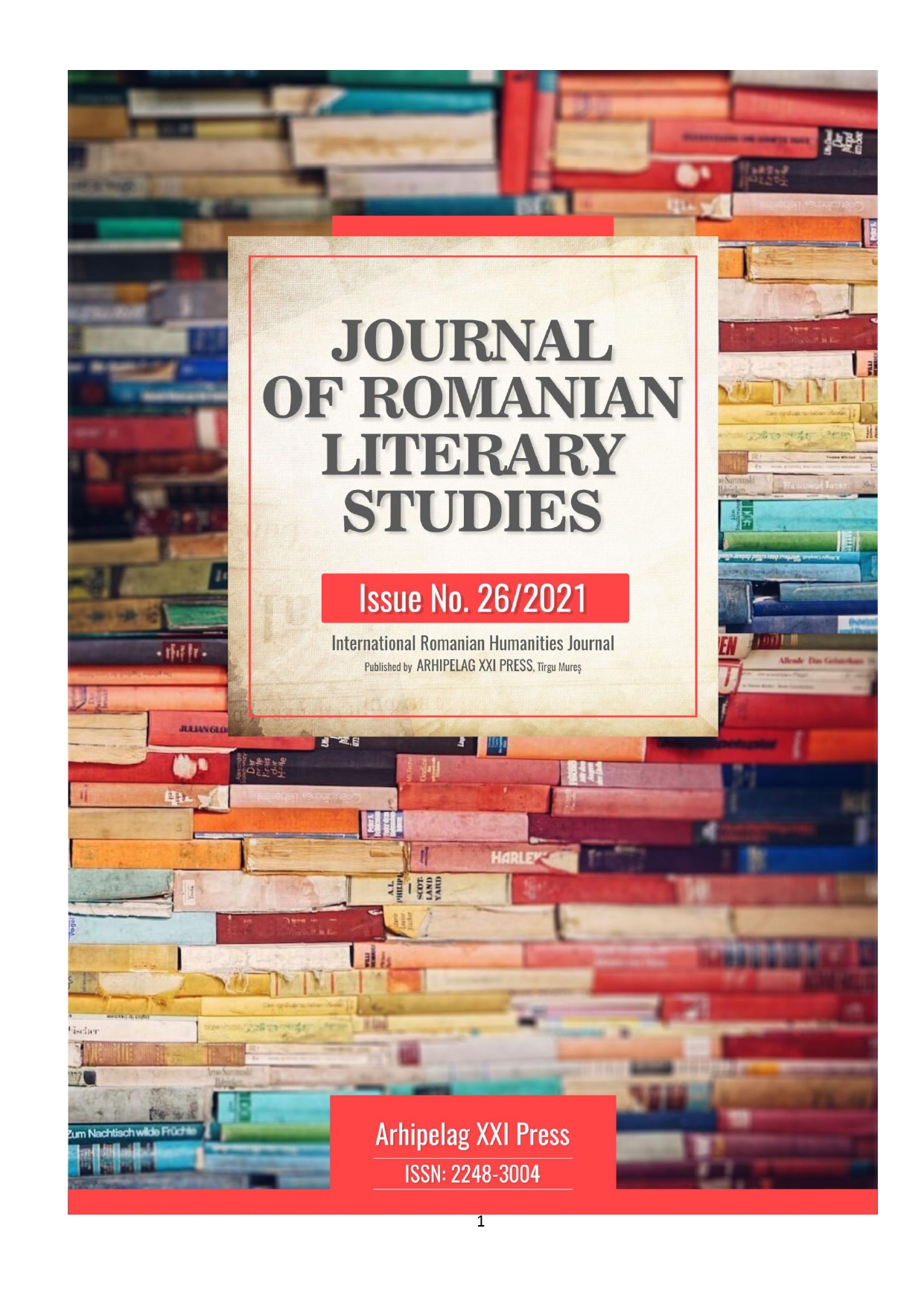
Storytelling is the oldest form of teaching. Throughout the history of literature, British children’s literature of the 18th century has had a very didactic purpose and appealed more to the cognitive intelligence of the child than to his emotional side, to empathy, to the universe of perception, associations that all lead to imagination and free will. Having a sole purpose, that is educational, intellectual and formative, the literature of the time did not give any right to free expression, but only to means of expression for feelings and manners that society approved of. Therefore social tightness, the corset of etiquette was refraining children from expressing their own personalities.
More...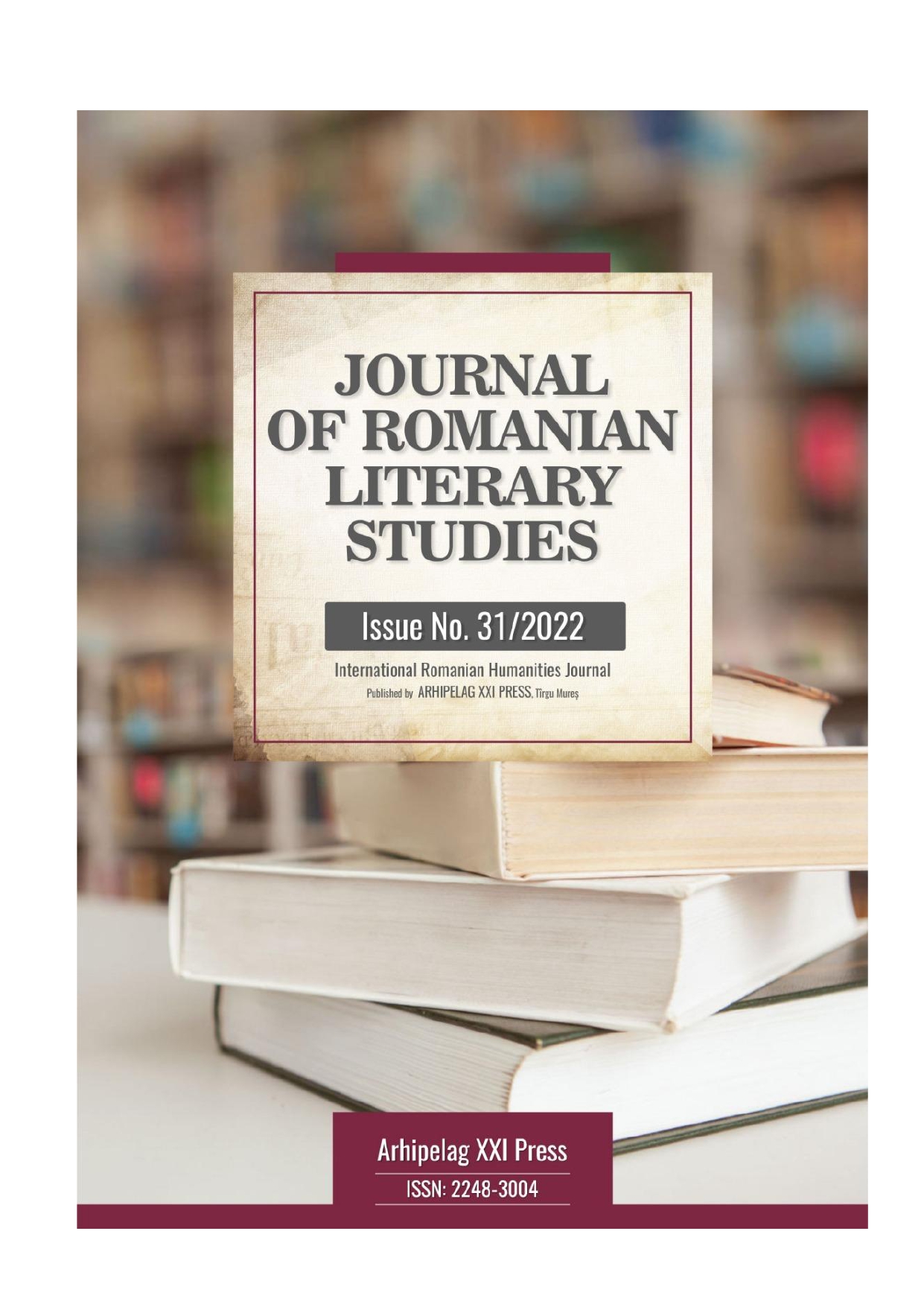
The history of the fantastic character is enunciated through the prophet Ezechiel’s vision (The Old Testament, Iezechiel, 1:13) from the Bible, and it is considered a product of the primitive fantasy, where the attributes of the characters who take part in the development of the events, are of visual order: The appearance of these beasts resembling the form of some burning coal, and of some torches of fire; fire was running among the beasts, and rays and thunders were springing from the fire. We can also discuss about fabulous characters, endowed with superanatural powers, which can control the magic, the same way as are the elves and the wizzards, good or evil, according to the conception in which their existence would be based on an archaic magic, appeared at the beginning of the world. The supernatural characters present distorted and contradictory natures, unstable, immoral, but also manifest correct, dignified and positive features and they follow the story’s heroes, on their way to triumph. This crisis at the personal level, which the majority of the characters pass through, represents the beginning of the affirmation of the fantastic. The overcoming of the blockage, the finding of the convenient solutions, the solvation of the limit-situations, is the key to the antifantastic. Some characters activate the fantastic’s function: The devils and vampires, in all their hypostases, the fairies and the wicked fairies, the gnomes and the elves play this part through excellence fantastic. Regarding the delimitation of the principles between good and evil, in the case of Middle Earth, we can distinguish between the positive and negative characters, the evil and destructive orks and the kind hobbits, some of whom may or may not know the redemtion. The wizzards of a story can be negative characters, as well as positive ones (Saruman vs Gandalf, Lord of the Rings, filmmaker Peter Jackson, 2001-2003). With the exception of the evil characters, the others are put on a trial and risk an interior transformation. by approaching the evil (Sauron himself was once a spirit of beneficence, as a result we can compare him to Lucifer, the fallen angel). The demons, the harmful spirits, the gods, the vampires, the ghosts, the werewolves and the monsters are archtypes of the imagination, which we can encounter frequently in the fantastic stories or in the popular beliefs. The clear distinction between good and bad represents a permanent topic of the differences from the moral and spiritual points of view in the story, which centres and influences the whole action of the narration.
More...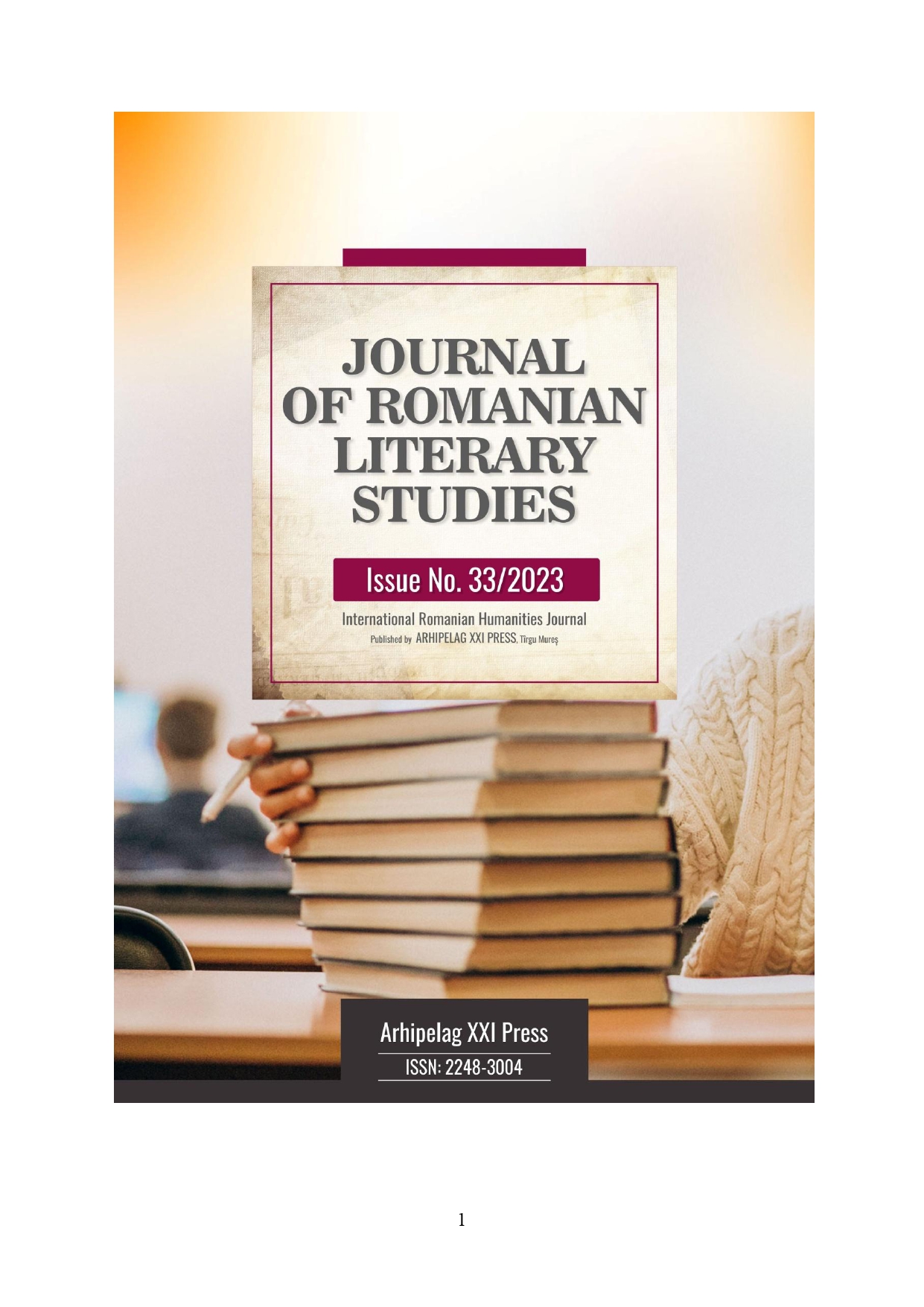
Literary practice in one or more foreign languages has been experienced by an impressive number of authors over the centuries. Translingual writers are writers who have practiced literature, exclusively or not, in a second language or in several. Many French-speaking writers have the tendency to produce a reflection on languages and language, and often even to make language one the main subjects of their writing. The change of language and its consequences in the life of exiles also occupy a prominent place in autobiographical accounts, novels and essays.
More...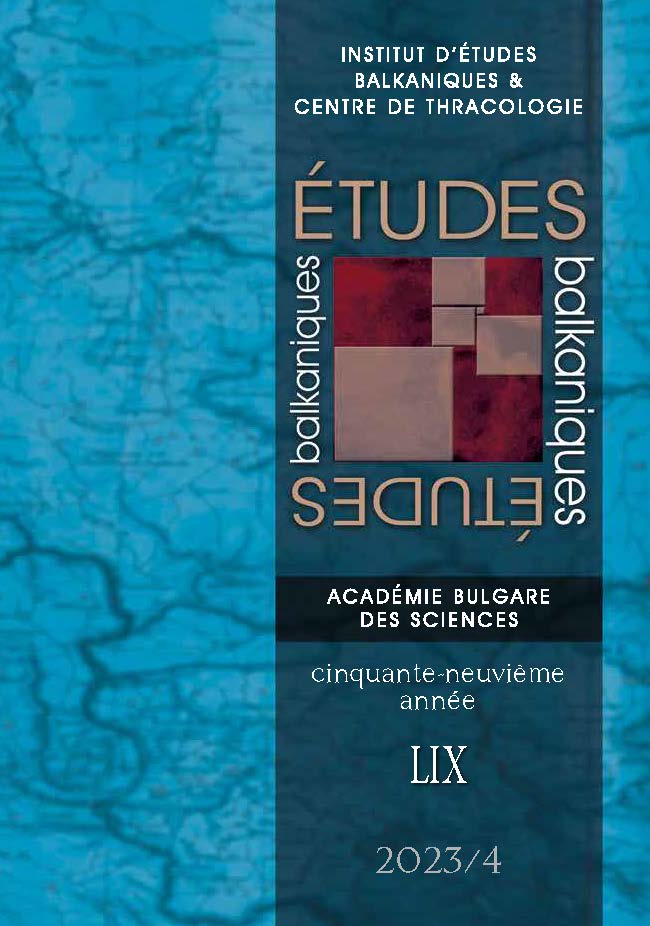
Albena Dimitrova (1969 – ), Bulgarian-born writer, poet and playwright, belongs to the corpus of « contemporary extreme » women writers who have chosen to express themselves in French, in the context of a migratory or exile situation, or out of an attraction to this language that represents the host country, France. In her novel Nous dînerons en français (2015) Dimitrova blends individual stories and major national events with extraordinary mastery. This work of autofiction bears witness to an era marked by austere politics in Bulgaria throughout the 1980s and 1990s, a tumultuous period when perestroïka and glasnost challenged the regime in power. Through the prism of a passionate and forbidden love, Dimitrova sketches the background of existences, showing how the destinies of individuals are buffeted by the winds of History.
More...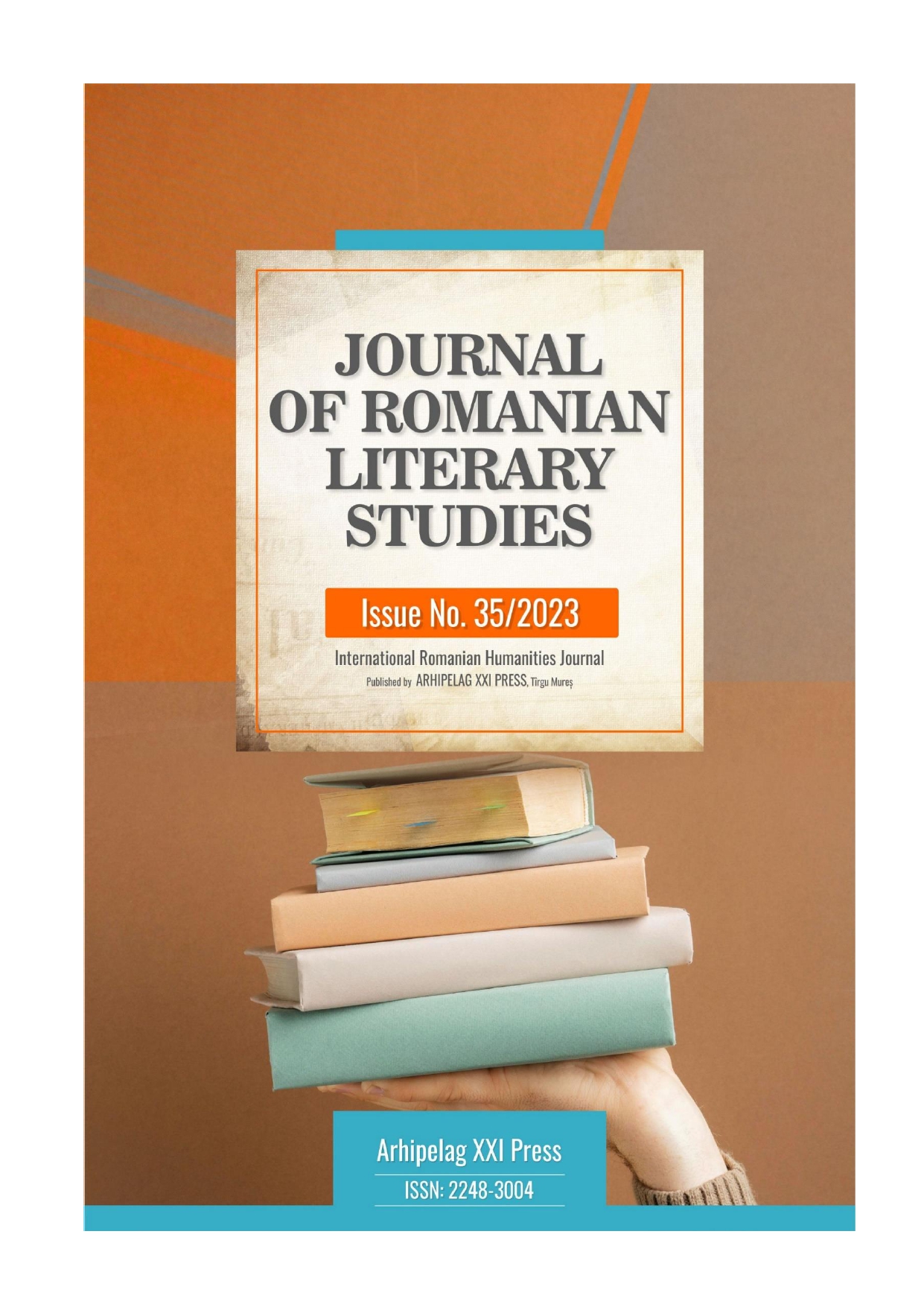
A complex phenomenon, the suicidal instinct is a challenging issue to discuss overtly. From a psychiatric perspective, in order to experience suicidal thoughts, one must also have underlying mental health conditions, a family history of suicide, suffer substance abuse, or encounter stressful life events resulting in trauma. As Shelly Kagan asserts in his book ”Death”, the act of contemplating suicide is, in general, considered evidence of being psychotic. Despite its devastating consequences, suicide ideation is particularly thought-provoking when observed through a philosophical lens. For this reason, Kagan takes this subject matter a step further and discusses if, when, and under which circumstances suicide could be an appropriate and justified thing to do. It is through literature that one may live multiple lives if one is not satisfied with one's own life. The only tools which are required are a narrative pattern, imagination, and reading skills. Imagine being a writer. You need not live vicariously through others. You can create your own story and dive right into it. You may shape whatever life you crave, thus waving goodbye to any suicidal feelings. As a writer, you would possess the ultimate weapon to do just that. But imagined life will never surpass actual life. Suicidal thoughts may haunt a writer's mind as well, and, as a matter of fact, they sometimes prevail. Therefore, my study explores the way in which particular word patterns, narrative structures and so on can expose the suicidal instinct which lingers in the writer's mind. Ultimately, my study aims to reveal the manner in which literature sheds light on its creator’s inner nature.
More...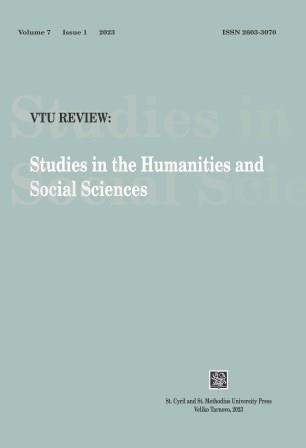
𝑇ℎ𝑒 𝑃𝑜𝑏𝑟𝑎𝑡𝑖𝑚: 𝐴 𝑆𝑙𝑎𝑣 𝑁𝑜𝑣𝑒𝑙 by P. Jones, published in 1895 and dedicated to “His Highness, Prince Nicholas of Montenegro,” is an intriguing piece of literature, even though little is known about either the author or the book. With an intricate plot comprising multiple framed stories and presented by an omniscient narrator, the text centres on the exploits of two “blood brothers” and is of modest literary merit. However, it vividly portrays traditional values, customs, national costumes, places, superstitions, and has a distinct local feel. This article aims to identify and analyse the key folkloric elements present in 𝑇ℎ𝑒 𝑃𝑜𝑏𝑟𝑎𝑡𝑖𝑚: 𝐴 𝑆𝑙𝑎𝑣 𝑁𝑜𝑣𝑒𝑙 and to provide a commentary on the novel from the perspective of cultural history.
More...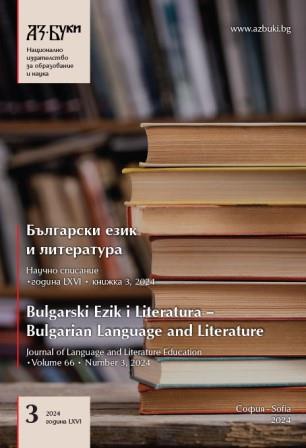
In the article I bring the issue of using fairy tales in creating emotional social skills among children. It occupies a special place in bibliotherapy on the grounds of unique effect. The fairy tales strengthen, in fantastic form, the regional views on human intercourse and show ideals of good and justice and criteria of assessing human actions. Thanks to fairy tales, they stimulate moral development and enable to adapt socially accepted patterns of behaviour. In fairy tales the life matters are shown. They try to answer the question what the world is, which rules it governs and how to cope with fears and risks.
More...
The article presents part of the results of a research activity carried out under the project “SUMMIT – Research, testing and analysis of the implementation of innovative approaches in the education of students and pupils from 1st to 4th grades – Part I”. The goal is for students to be prepared methodically and correctly to develop the topics related to studying/teaching works from Bulgarian folklore, included in the 27 alternative reading books from first to fourth grade, through which the “Literary Education” component is realized. Tables No. to No. 14 show the number and titles of texts from Bulgarian (and foreign) folklore that are included in the analyzed 15 reading books for first and second grade. The relative share of works from Bulgarian folklore, compared to the total number of studied works, as well as texts that are present in more than one reading book, is highlighted.
More...
The Stepford Wives, a novel by Ira Levin published in 1972, describes a micro-dystopian society, which imposes a strict ‘traditional’ order, by transforming women into compliant wives programmed to serve their husbands. The book has been adapted to screen several times. The present paper will focus on a comparison between the original literary work and the first adaptation of 1975 by British director Bryan Forbes, seen through the notions of genre, gender, class and race.
More...![За книгата: Румяна Л. Станчева. Сравнително литературознание. Фаталната жена и 5 европейски кройки на романа. София, Изд. Колибри, 2023. [Roumiana L. Stantcheva. Littérature comparée. La femme fatale et 5 coupes européennes du roman]](/api/image/getissuecoverimage?id=picture_2024_82646.jpg)
Book review: Румяна Л. Станчева. Сравнително литературознание. Фаталната жена и 5 европейски кройки на романа. София, Изд. Колибри, 2023. [Roumiana L. Stantcheva. Comparative Literature. The Femme Fatale and 5 European “Cuts” of the Novel. Sofia, Colibri Publishers, 2023./ Littérature comparée. La femme fatale et 5 coupes européennes du roman.]
More...
Book review: Йоана Славчева. Румънският политически роман от 60-те и 70-те години на XX век. Велико Търново, УИ „Св. св. Кирил и Методий“, 2022, 187 с. [Joanna Slavcheva. The Romanian Political Novel of the 1960s and 1970s. Veliko Tarnovo, St. Cyril and St. Methodius University Press, 2022]
More...
The purpose of the paper is to analyze the novel The Man in the High Castle by Philip K. Dick based on a reader-response approach, which shows how present-day concerns are echoed in this work of fiction. Contact with other cultures and our relationship with them as individuals are based on the political context prompting our interaction with certain other cultures. At the same time, personality is the result of our contact with other cultures as well, not just with our own, as much as it is the result of our psychological tendencies. The soft power of Japanese and Asian cultures in general is presented in this novel. We also see America as being under the influence of Japanese culture, a situation which poses conflicts for some of the characters, such as Childan. The way individuals interact with society is related to the various conflicts they may experience.
More...
The purpose of the paper is to analyse the novel A Young Man in Search of Love by Isaac Bashevis Singer. This novel combines the psychological, philosophical, and sociological dilemmas of a young person with the realities of his own culture and his historical time period. We realize how his Jewish and Yiddish traditional cultural heritage can interact with the frame of the modern times he lives in, and also with the way that he feels about himself. The meaning of life and the way he can deal with his individual freedom and with his relationships in order to reach a deeper understanding of himself are topics present throughout the novel. Reader-response criticism is used in order to better understand the relationship between the fictional character and the writer.
More...
Among the Romanian German-speaking writers, Cătălin Dorian Florescu, settled in Zurich, Switzerland, and Jan Cornelius, who emigrated to Germany, in Dusseldorf, can be analyzed in tandem due to some remarkable similarities: their origin in the Romanian Banat, their exile during the dictatorial communism which lead. in both cases, to multilingualism and multiculturalism, their successful affirmation as prose writers in the German-speaking area, the fact that they are both famous due to their autobiographical prose in which they frequently problematize the opposition between East and West, and, most surprisingly, the irony and humour in their treatment of the theme of identity. In the present work we have identified those important marks of identity present in their literary works, which justify their double literary belonging, both to German-language literature and to Romanian literature.
More...
This paper focuses on representations of Otherness in Chinua Achebe’s last and most modern novel – “Anthills of the Savannah”, first published in 1987. As opposed to previous literary works by the same author that mainly focused on the disastrous encounter between the African and the European cultures, the above-mentioned novel is chiefly concerned with African culture itself, the one that has developed in postcolonial times. I argue that “Anthills of the Savannah” relies on discourses of Otherness and Sameness in order to give an answer to the complex problem of identity construction and I focus on two of the most relevant representations of Otherness that I have identified in Achebe’s novel – on the one hand, the way in which Achebe uses the language in the novel not only as a class marker but also as a marker of the individuality of the Africans as opposed to Europeans and, on the other hand, the relevance of Western experience and how the novel questions the way in which the African elite, educated in Western countries can and should combine forces with the masses in order to create a just and fair society. The conclusion is not bleak but, Achebe makes it clear that, in order to bring about the eagerly awaited change the whole nation, not just the elite, needs to be adequately educated to that effect.
More...
Our society repeats some models, some patterns, which literature has exemplified over the years in different forms. Two of the illustrious representatives are P.G. Wodehouse and Ion Luca Caragiale, writers who managed through their, sometimes sarcastic analyses, to render, with a lot of humour, human typologies and social concepts of nineteenth-century life, both of them writing masterpieces of national and universal literature. Our paper aims to analyze these typologies and situations from the point of view of the comic situations in which the characters are illustrated.
More...
The dystopian novel Blindness (1995) is a parable about humanity, about finding the lost meaning. The writer subjects the individual to a process of returning to himself, by suppressing a sense. Put into this exercise of survival, man rediscovers his ephemeral condition in the deepest scatological zone, redefining himself morally and spiritually. Thus, the epidemic of “white evil” manages to rehabilitate the social function of people, subordinate to each other through this infirmity. The free, nonconformist style, suitable for observing sordid reality, invites meditation on existence, and the aesthetic value resides precisely in the provocation of the loss and rediscovery of the Self in the encounter with the Other.
More...
This article aims to identify typologies of readers of Fantasy literature and to reveal some of the stereotypes of alternative world-building that readers discover, which are not necessarily inverted structures of the real world, as there may be similarities between these worlds. Also, the reader and the character may face similar problems, of course the reader or the character acts according to their own status. Readers of fantasy literature can be seen as 'heroes' of their own reading experience, because they get to navigate fantasy worlds and cope with the intellectual and emotional challenges of the stories they read. These readers may not be fighting monsters or traveling through mythological realms, but in their world, immersed in fantastical universes, they live through an intense, often choice-filled experience of self-discovery. They may face moral dilemmas or challenges in understanding complex real-life ideas if there is no adult to maintain a balance of morality, protection and, above all, love, as the heroes of the books do.
More...
According to the narrator of Romanesques, the symbolic appropriation of fantasies could be achieved within the framework of creative work by only one possible means: the telling of these fantasies. Convinced of the cathartic force of writing, one of the objectives for his autobiographical cycle is the staging of the narrator's fantasy. The Robbe-Grilletian body, always described through the narrator's obsessions and labile memory, is a fantasized body, subject to the vagaries of his imagination and the virulence of his desires.
More...